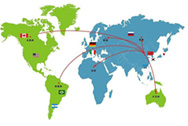- Expanded Polystyrene
- Flame Retardant EPS
- Fire Resistant EPS
- FMS EPS
- FSA EPS
- EPP Black
- EPP Gray
- EPP White
- Expanded Polypropylene AG17
- Expanded Polypropylene CH17
- Expanded Polypropylene CS17
- Expanded Polypropylene DB17
- Expanded Polypropylene GR17
- Expanded Polypropylene ML17
- Expanded Polypropylene NF17
- Expanded Polypropylene PB17
- Expanded Polypropylene PR15
- Expanded Polypropylene RD17
- Expanded Polypropylene TL17
- Expanded Polypropylene YL17
- Expanded Polypropylene ZS15
- 4,4'-Oxydianiline

The Supply and Demand Situation of Expanded Polystyrene
Expanded Polystyrene EPS is also called Foamed Polystyrene, it is made of polystyrene by suspension polymerization, then add blowing agents to it. EPS is of white beaded particles, the relative density of it is 1.05. It has low thermal conductivity, the water absorption property of it is small. It has the resistance to vibration and shock, heat insulation, sound insulation, moisture and vibration. And the dielectric properties of EPS is excellent. It can be soluble in acetone, benzene, toluene, ethyl acetate, dichloroethane, chloroform, and is insoluble in ethanol, n-hexane, cyclohexane, solvent naphtha. The European EPS market after a shaky opening, is booming in the first half. Manufacturers and resellers since 2014 have very little material and appliance operating rate of contraction for 70 to 75 % low. But second-quarter gap polystyrene EPS tightening supply of raw materials.
EPS requirements see also seasonal uplift, also promoted by higher price expectations of the buyers. After summer breaks to calm, September, October, consumption is growing again, but it is slowing, with supply situation has improved, more balanced supply and demand. Market experts here forecast for 2014 demand increase for 2013 is flat or up portion. Germany is the largest market EPS, landslide and its consumption by the construction industry is expected to improve in the short term is unlikely to decrease. Benelux (Benelux) also reduced market demand, but consumption increased in southeastern Europe. CMAI estimates produced 940,000 tons of Western Europe, demand is below 800,000 tons. Excess production capacity is still in Europe, its production capacity of approximately 1.4 million tons/year, while consumption of 1.1 million tons/year. Kaucuk company stage expansions to 60,000 tons/year was completed in the early days. Czech Republic Krulupy devices, have in the phases from 20000 ton/year production capacity, the device was first produced in 1996. Nova chemicals has been idle since late last October in the United Kingdom 75000 tonnes/year plant in Carrington, the device represents a Nova one-fourth of the company's production capacity in Europe, seems to close for at least one year.

